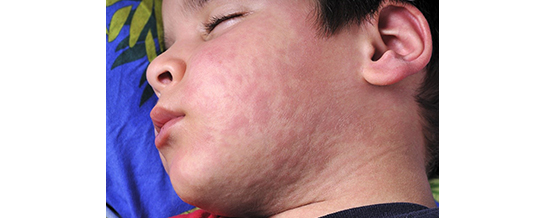How to Care for Your Child with an Allergic Reaction
This leaflet will provide information about the allergic reaction: causes, symptoms, diagnosis, treatment, and home care advice.

What is an allergic reaction?
- Is a reaction of your child's body to something that is usually harmless such as pollens, dust mite and food protein
- Eggs, peanuts, cow's milk, fish and shellfish are the most common causes of allergy
- An allergic reaction is more common in children who have other allergic conditions such as asthma, eczema and hay fever.
- The allergic reaction can be:
- Mild to moderate
- Severe: This form of allergic reaction is also called anaphylaxis and is life-threatening.
What are the signs and symptoms of a mild allergic reaction?
An allergic reaction can include one or more of these symptoms, and a number of them may happen at the same time:
- Hives, welts or wheals (a red, lumpy rash, like mosquito bites)
- Tingling feeling in or around the mouth
- Stomach pain, vomiting and/or diarrhoea (loose or runny poo)
- Swelling of the face
What are the signs and symptoms of a severe allergic reaction (Anaphylaxis)?
Along with the signs of a mild to moderate reaction we listed above, the symptoms of a severe reaction are:
- Difficulty in breathing or noisy breathing
- Continuous cough or wheeze
- Swelling of the tongue
- Swelling and/or tightness in the throat
- Difficulty talking or hoarse voice
- Persistent dizziness or collapsing
- Becoming pale and floppy (infants/young children)
How is an allergic reaction diagnosed?
The doctor will ask a few questions about your child's health and examine your child to check if your child has signs of an allergic reaction. Your doctor will decide if further examination or blood tests are needed
How is an allergic reaction treated?
Treatment options depend on the severity of the allergic reaction
Mild to Moderate allergic reaction is treated by:
- Oral antihistamine medication such as chlorphenamine, Cetirizine or Loratadine.
- Period of observation to make sure that your child condition is getting better
Severe allergic reaction (anaphylaxis) is treated by:
- Epinephrine (EpiPen) is sometimes called Adrenaline. It is a treatment using an injection containing a medicine called epinephrine injected into your child's outer thigh.
- Your child will need to be observed in the hospital for a period of time
- Your child will need a follow up in the allergy clinic for further assessment.
How to act if your child has a severe allergic reaction (Anaphylaxis)?
If your child has a severe allergic reaction (Anaphylaxis):
- Have your child lie down, but if breathing is difficult, allow them to sit.
- Give Epinephrine (EpiPen) injection into their outer thigh
- Call an ambulance immediately
- You can give Epinephrine after 10 minutes if there is no improvement.
- Do not be afraid to use (EpiPen). If someone is severely unwell with an allergic reaction, they are more at risk from the reaction than from the (Epipen).
How to keep and store (EpiPen)?
- Keep (EpiPen) in the protective case as the Adrenaline is sensitive to light.
- Keep it at room temperature to prevent the contents from discolouring.
- Avoid storing it in a fridge or a hot place.
Prevention:
- Avoid using substances that your child is allergic to (the allergen)
- Accidental exposure to a particular food allergen (especially peanuts) is possible when hidden or an unnamed ingredient. Here are some steps you can take to reduce this risk:
- Read all food labels carefully, even if the product has been eaten before, as recipes change
- Keep any food that can cause allergy separate from other foods
- Be more careful when eating out in restaurants, ask about the ingredients in the food
- If a relative or friend has been eating something that your child is allergic to, make sure they wash their hands and rinse their mouths well before touching your child
- Sometimes medicines have more than one name, make sure that you know all the names of the medicines that your child is allergic to.
- Make sure your child carries an EpiPen at all times.
When should I seek medical advice?
Call 999 for an ambulance if:
- Your child has severe symptoms of allergic reaction and is not responding to the treatment at home
- You do not have Epinephrine (EpiPen) injection at home
- Your child has an anaphylactic reaction

